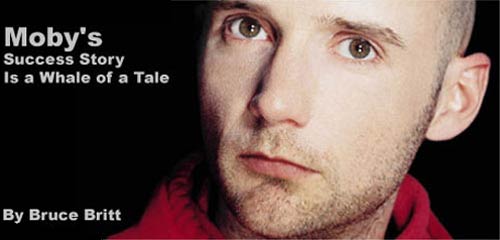Moby’s Success Story Is a Whale of a Tale

A bona fide descendent of “Moby Dick” author Herman Melville, Moby came by his gargantuan nickname naturally. But until recently, the composer’s record sales fell way short of whale-sized expectations. What follows is Moby’s dramatic story; a saga of creativity, redemption and controversy that rivals anything his esteemed relative ever wrote. Read on…
As the year 2000 commenced, Moby’s career prospects looked dim. Hailed as a techno music pioneer, Moby had developed a loyal cult following thanks to his fiery composing skills, humanitarian views and disarming, accessible demeanor. In fact, some pundits wagered that Moby was destined to become the first superstar of the Rave Generation, the quirky Elvis of Electronica.
But in 1997, Moby’s bright future was harpooned with the release of his guitar-oriented album, Animal Rights. Critics and fans were ambivalent about the album. While many fans viewed the disc as an homage to Moby’s punk roots, pundits chaffed at the album’s grungy, guitar-oriented textures, while some fans leveled “sell-out” accusations at their hero. It appeared Moby had hopped aboard the alt-rock bandwagon and paid dearly for his folly.
Just as critics were poised to dismiss Moby as yesterday’s news, the canny composer imaginatively returned to his dance-floor roots with his 1999 album, Play. Featuring 18 electronic compositions that incorporated samples from classic gospel and blues songs, Play reestablished Moby as a techno trailblazer and appeased alienated fans. All seemed well until Moby and his advisors made a controversial move that would reverberate throughout the music industry and make Moby one of the most relevant music stories of 2000.
Despite its innovative grooves, Play was almost completely ignored by radio and MTV. Undaunted, Moby sought other means of exposing the album, including licensing the album’s tracks for movies, television and radio ads. It would be an understatement to say the ploy was successful. As 2000 careened to a finish, Play had become the most licensed album in history, with all of its 18 tracks being featured in countless ads and films like “Any Given Sunday”, “The Next Best Thing,” “Play It to the Bone,” “The Beach,” “Body Shots” and “Big Daddy.” Moby’s aggressive licensing policy helped boost global sales of Play past the 5 million mark. In his unique way, Moby had totally redefined the term “commercial rock.”
But in the minds of some embittered hardcore fans, Play transformed Moby from dance-floor messiah to Madison Avenue pitchman. Moby confronted his critics with customary elan, informing them that some of his album proceeds went to environmental and humanitarian charities.
Born Richard Melville Hall in Harlem, New York, Moby surfaced in the early ‘90s with the rave anthem “Go.” His discography is a study in eclecticism, including the inspired 1995 album Everything Is Wrong, the riotous 1996 recording Animal Rights and the ambitious 1997 soundtrack experiment I Like to Score. His reinvented himself on the 1996 CD Everything Is Wrong - Mixed and Remixed. He has released countless CD singles and recorded under several aliases, including DJ Cake and Voodoo Child.
Now, with the groundbreaking success of Play, Moby reigns as the biggest fish in the techno pond - appropriate status for a descendent of Herman Melville.






Community
Connect with BMI & Professional Songwriters